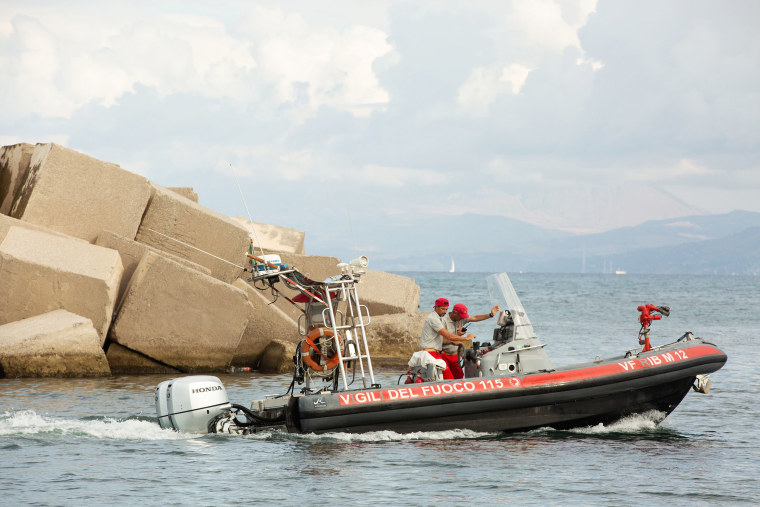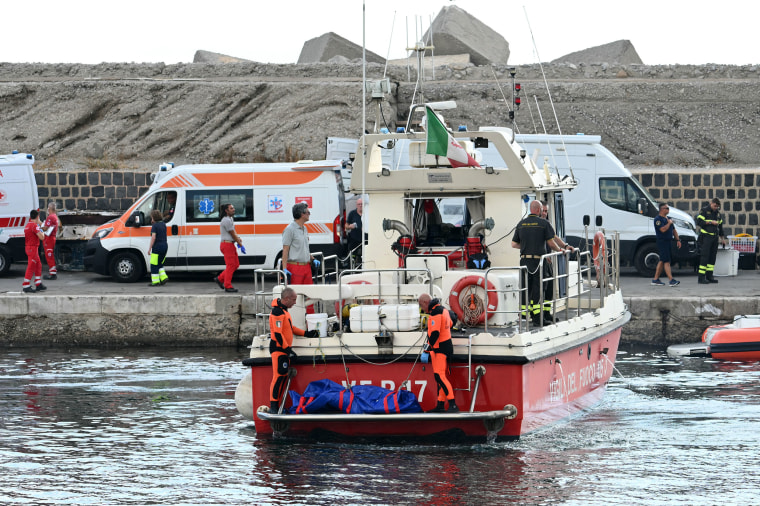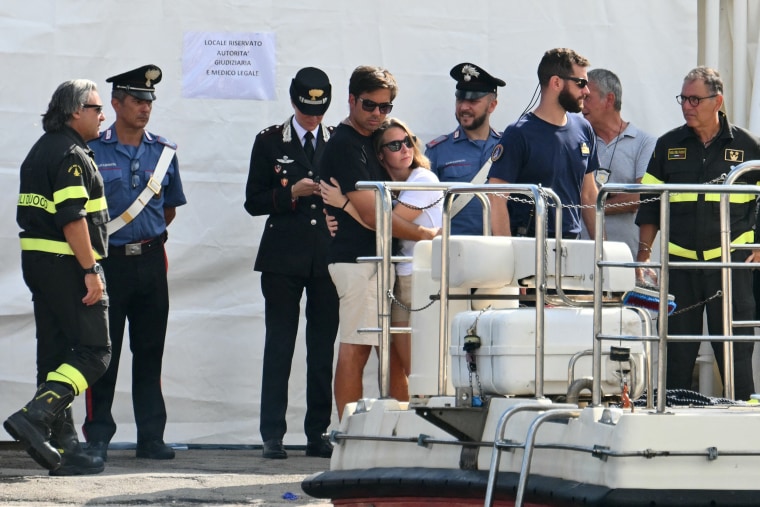PORTICELLO, Italy — Survivors of a storm that sank a superyacht off the coast of Sicily recounted their ordeal to one of the doctors who rushed to their aid, with some saying it took mere minutes for the 180-foot ship to go down.
Dr. Fabio Genco, head of the Palermo Emergency Medical Services, told NBC News on the phone Thursday that he arrived in the seaside village of Porticello before dawn Monday, about an hour after the $40 million Bayesian sank in the violent and sudden storm.
Of the 22 people onboard, 15 survived despite storm conditions and darkness, climbing onto a lifeboat before being rescued by a nearby sailboat. The crew members have made no public statements so far, though some have been interviewed by investigators.
“They told me that it was all dark, that the yacht hoisted itself up and then went down,” Genco said, recounting what the survivors told him. “All the objects were falling on them. That’s why I immediately made sure, by asking them questions, if they had any internal injuries,” he said.
It appears they had just minutes to abandon the sinking ship, Genco said.

“They told me that suddenly they found themselves catapulted into the water without even understanding how they had got there,” he said, “And that the whole thing seems to have lasted from 3 to 5 minutes.”
Giovanni Costantino, CEO of The Italian Sea Group, which owns Perini Navi that built the Bayesian, told Sky News that there were no flaws with the design or construction of the yacht. He said their structure and keel made boats like that “unsinkable bodies.”
In an interview with the Italian newspaper Corriere della Sera, he disavowed responsibility, blaming instead the actions of the crew. “Mistakes were made,” he said.
Genco said one of his colleagues who arrived at the scene before him initially thought that only three people survived, but the coast guard reported there were other survivors and more emergency services were called in.
When Genco arrived, he found scenes of panic and despair.
“Unfortunately, we are used to such panic scenes because we are used to the shipwrecks that happen on Lampedusa,” Genco said, referring to the island southwest of Sicily, where the wreckage of boats carrying migrants on the sea journey from North Africa to Italy are often found.
Six of the passengers were declared missing Monday, and by Thursday, the bodies of five had been recovered from the wreck, some 160 feet underwater.
Among those who survived is Angela Bacares, wife of the British tech mogul Mike Lynch, whose body was recovered Thursday.

Another survivor has been identified as Charlotte Emsley, 35. She told the Italian news agency ANSA that she had momentarily lost hold of her year-old daughter, Sofia, in the water but managed to retrieve her and hold her over the waves until a lifeboat inflated and they were pulled into safety.
Dr. Domenico Cipolla at the Di Cristina Children’s Hospital in Palermo is also part of a team of medical professionals treating the shipwreck survivors. He told the BBC on Wednesday that Emsley and her daughter, as well as the father of the child, who Cipolla said also survived, are continuing to receive psychological help.
“Psychological support was constant and is constant even today, because basically it is the wounds of the soul that are the most in need of healing in these cases,” Cipolla said.
Genco also told NBC News that he was especially concerned about the child. “She did not understand anything. She was soaking wet and cold,” he said.
Karsten Borner, the Dutch captain of the Sir Robert Baden Powell, a yacht that was anchored near the Bayesian, said by phone Wednesday that he saw a thunderstorm come in at around 4 a.m. local time (10 p.m. ET) Monday, followed by what looked like a waterspout, a type of tornado that forms over water.
The International Centre for Waterspout Research noted on X that there was a “waterspout outbreak” off the coasts of Italy on Monday, the day the Bayesian sank.

“I turned on the engine and made maneuvers so that we wouldn’t collide with the Bayesian, which was anchored about 100 meters from us,” Borner said. “Then all of a sudden it disappeared. Then the wind calmed down, we looked around, and saw a red flare.”
Borner said he got into his boat’s tender and saw a life raft with 15 people on it. Members of the crew were administering first aid.
“I don’t know why it sank so quickly, but it may have something to do with the mast which was incredibly long,” he said. Questions have been raised about whether the mast was to blame for the accident as tall masts, even with the sails down, have more surface area exposed to the wind, which can contribute to tipping a vessel in a storm.
The CCTV footage that emerged Tuesday showed the yacht’s 250-foot mast, believed to be one of the tallest aluminum sailing masts in the world, lashed by the storm as it appears to tilt to one side before disappearing.






